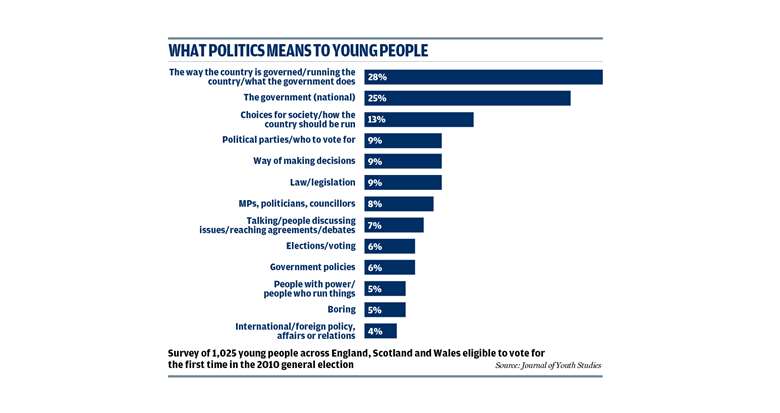Research Report: Social Differentiation in Young People's Political Participation
Charlotte Goddard
Tuesday, March 18, 2014
An examination of young people's attitudes to politics and to what extent their background affects their engagement.

Download a PDF of this graphic
Authors Matt Henn and Nick Foard, Nottingham Trent University
Published by Journal of Youth Studies, Issue 3, 2014
SUMMARY
With a general election set for next year, youth engagement in politics is poised to come under the spotlight once again. Researchers Matt Henn and Nick Foard, from Nottingham Trent University, wanted to investigate young people's level of interest in and understanding of politics and elections, youth attitudes to the political processes and democratic institutions in the UK, and the degree of faith that young people have in politics. They particularly wanted to find out whether young people's background and life circumstances, including gender, ethnicity, social class and education, have an impact on their political engagement. This differentiation has often been neglected by previous research which tends to treat young people as a homogenous - and politically apathetic - group.
The researchers conducted an online survey of 1,025 young people across England, Scotland and Wales who were eligible to vote for the first time in the general election of 2010. Respondents were drawn from a panel co-ordinated by Ipsos Mori. The researchers also conducted 14 online focus groups with 86 young people who had chosen not to vote in 2010.
Their paper - Social Differentiation in Young People's Political Participation: The Impact of Social and Educational Factors on Youth Political Engagement in Britain - found young people described politics as being about central government and the political elite. In response to an open question in the survey, 28 per cent defined politics as being about governance, and nearly as many (25 per cent) said it was about the national government. Young people in the focus groups described politics as "boring", "confusing" and "corrupt".
Despite the barriers to their engagement, the majority of young people surveyed said they did have an interest in politics, with 63 per cent claiming at least some interest in political affairs, and 64 per cent an interest in the 2010 general election. There were variations in interest across different groups - males were more likely to be interested in politics as were young people from middle-class households. The strongest indicator of an interest in politics was current education status, with those in full-time education significantly more likely to be interested in political affairs.
Many young people surveyed felt they had no power to influence the political process with just over half (51 per cent) agreeing that "young people like me have no say in what the government does". Only 15 per cent disagreed with that statement. Those from black and minority ethnic (BME) groups felt significantly more politically marginalised than their peers, while young people in full-time education felt less marginalised.
The survey found young people were generally supportive of the electoral process but had doubts about its effectiveness in promoting change. Forty three per cent believed elections keep politicians accountable and 50 per cent agreed they provide a vehicle through which politicians are compelled to listen to voters.
Full-time students and young people from BME groups were significantly more supportive of elections than their peers.
IMPLICATIONS FOR PRACTICE
This research has found differences in social class and whether or not young people stay on in full-time education have a clear and consistent impact on attitudes to politics, to the democratic system and to young people's place within it. These findings suggest government social policy that addresses socio-economic-related issues, particularly policy that aims to expand educational participation, may have an impact on young people's engagement with democratic institutions and with the political process.
FURTHER READING
Social Change and Political Engagement among Young People: Generation and the 2009/2010 British Election Survey, Andy Furlong and Fred Cartmel, Parliamentary Affairs, 2012. This paper draws on the 2009/10 British Election Survey to explore the political engagement of young people in Britain in the context of social change.
Understanding Electoral Turnout Among British Young People: A Review of the Literature. Edward Phelps, Parliamentary Affairs, 2012. Reviews the literature on youth engagement in politics and argues young people are too often treated as a homogenous group.
Audit of Political Engagement 10: The 2013 Report, The Hansard Society. An annual audit of political engagement in Britain, including among young people.




